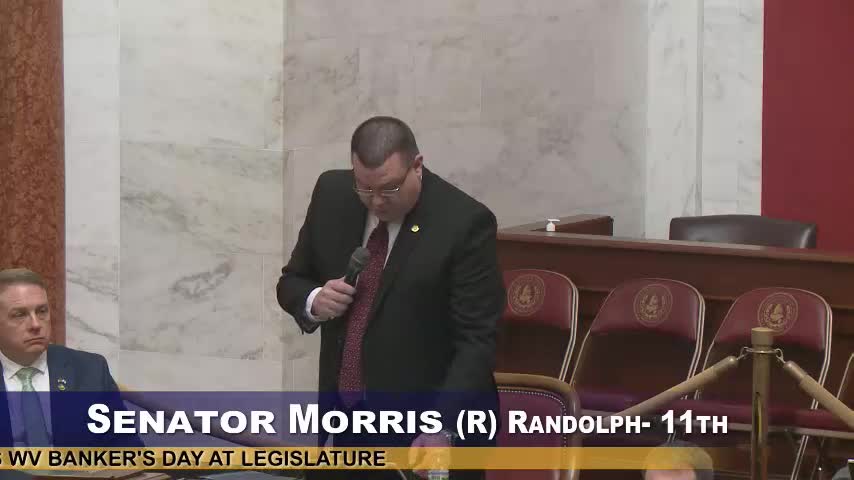West Virginia Senate debates vaccine-requirements bill; rejects amendments on religious exemptions, reporting and polio carve-out
Get AI-powered insights, summaries, and transcripts
Subscribe
Summary
On Feb. 17 the West Virginia Senate advanced a committee substitute for Senate Bill 460, a measure addressing school and child-care immunization rules, after rejecting multiple amendments that would have carved out religious-school authority, added a polio exception and required school-level vaccine reporting.
The West Virginia Senate on Feb. 17 debated a committee substitute for Senate Bill 460, a measure addressing vaccine requirements for schools and state-regulated child-care centers, rejected four amendments and ordered the bill to be engrossed for third reading.
The bill, described on the chamber floor as a second reading of a governor-introduced committee substitute, would apply state immunization rules to public, private and parochial schools and to state-regulated child-care centers; senators debated whether private or religious institutions should retain independent authority to set vaccination policies.
Senator from Brooke, explaining an amendment that would have allowed schools operated by churches or religious entities to continue setting their own vaccine rules, said, “My amendment ... simply states that schools that are operated by a religious entity or a church here in the state of West Virginia will be able to continue to, offer a vaccine requirement that is in accordance with law as it stands now, if doing so is in accordance with the tenants of that religious, with that entity's beliefs.” The Senate rejected that amendment, 10 yays to 21 nays with 3 absent.
Senator from Cabell, a cosponsor of the Brooke amendment, framed the dispute in constitutional terms and warned of litigation. “What we have before us is an issue of — an example of what I'm going to call government overreach,” he said, urging protection for religious freedom guaranteed in the state constitution.
Opponents warned the amendment would reverse a decade of practice and limit individual rights. “It's trying to codify what's called an abstention doctrine,” said Senator from Ohio, who opposed the change and argued the existing law already requires private and parochial schools to follow state immunization rules. Members also debated whether removing causes of action for students or parents to sue private schools would deny remedies in discrimination or medical-exemption disputes.
Senators rejected three other amendments during the lengthy debate. An amendment by Senator Weld seeking to alter language that characterized a public education right as “fundamental” failed on a roll call, 13 yays to 18 nays with 3 absent. An amendment by Senator Wolf to add a proviso exempting mandatory polio immunization language failed, 12 yeas to 19 nays. A Marion amendment that would have required each school and licensed child-care center to publish annual counts of vaccinated and exempt students was rejected, 9 yays to 22 nays with 3 absent.
Discussion ranged from public-health concerns to parental choice and administrative burden. Senators who supported exemptions argued parents choose private religious schools and must be able to rely on those institutions’ policies; opponents cited public-safety prerogatives, existing state law and potential burdens on small private schools. Questions also touched on vaccine production and ethics, with one senator referencing testimony and depositions about fetal cell lines used historically in vaccine development.
After the roll-call votes on amendments, the clerk announced that the bill would be engrossed in advance of third reading, meaning the Senate advanced the committee substitute for a formal third reading at a later session rather than taking final passage on Feb. 17.
Votes at a glance: Senate Resolution 7, recognizing Glenville State University's 153rd anniversary, adopted (31 yays, 0 nays, 3 absent). Senate Resolution 8, designating 2025 West Virginia Bankers Day, adopted by voice vote. On Senate Bill 460 (committee substitute): Brooke amendment (religious-school carve-out) rejected, 10–21–3; Weld amendment (language on fundamental right to public education) rejected, 13–18–3; Wolf amendment (polio proviso) rejected, 12–19; Marion/Garcia amendment (school- and center-level vaccine reporting) rejected, 9–22–3. The committee substitute was engrossed for third reading.
The bill's next step is a formal third reading on the Senate floor; no final passage or veto action occurred on Feb. 17. Additional committee reports heard earlier in the day referenced other bills and committee referrals, but SB 460 was the principal substantive debate during the morning hours.
— End —
